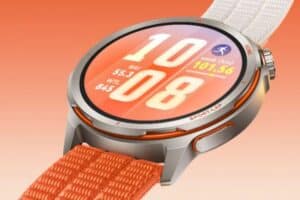Samsung's top-of-the range 78-inch U9000 curved television, launched at last week's Samsung Forum 2014 in Malaga, Spain, has the unusual distinction of being the most curved TV in the world right now.

The extent of a TV’s curvature dictates the user’s viewing experience and the U9000’s curvature of 4200R (screen curvature is measured in radius, denoted with an R) is claimed to offer an optimal viewing experience from three or four metres away. The TV is Ultra High-Definition (UHD), which is not as sharp as 4K, but it’s impossible for the human eye to notice the slight difference.
In fact, after watching a few minutes of high-definition content I felt completely enveloped and in my own world, with the sounds in the show hall being the only distraction. Colours are bright and the contrast ration is great, with blacks being blacker and whites whiter. The TV uses Auto Depth Enhancer technology that allows users to view 3D TV without the need for 3D glasses, allowing friends and family to enjoy 3D content – not just the person wearing the glasses.
A 78-inch TV is rather big for most homes and so Samsung has extended the line to include smaller models, starting at 22-inches. The top of the range curved TV comes in at 105-inch.
However, the TV that stole the show was not curved. It was the Samsung flat panel UHD 110-inch TV. Standing on the sidelines, I noticed that no one walked past the TV without marvelling at its sheer size. This is the largest UHD in the world, and you don’t appreciate its size until you stand in front of it and watch it – or try and watch it. I found myself standing more than five metres away and still getting dizzy from the larger-than-life images.

definition – four times better resolution compared to a full-HD display.
The TV comes with its own stand that lets users tilt it vertically. Due to its size, it cannot be mounted on a wall. It also cannot be bought in a store and is built to order. It costs a cool R3 million and, yes, delivery and installation fees are included.
Samsung also announced a range of TVs geared for the emerging markets, including the 23-inch Samsung ACDC TV, which runs off various power sources, such as solar panels and car batteries. Then there is the low-cost Family TV, an LED unit that offers features like screen-grabbing and sound recording.
Samsung is one of the world’s two leading tablet manufacturers, along with Apple. It has won market share from the iPad maker and, with the new Galaxy NotePro and TabPro devices displayed last week, the company is planning on gaining more tablet ground.
The Galaxy NotePro uses a 12.2-inch WQ-XGA (Wide-Quad Extended Graphics Display) resolution, offering a resolution of over 4 million pixels. This means sharper images and crisper text, but at 12.2-inch I found it rather big – bigger than many notebook displays. However, the tablet is targeted at the businessperson, and with a quad-core Snapdragon 800 processor with 3GB RAM and 32GB of storage space, the device can easily replace a notebook.
The large screen means that, when the virtual keyboard pops up, users will have enough screen space to see the app they are working on and use the virtual keyboard without having to minimise. The virtual keyboard’s buttons are also quite large, which in most cases will eliminate the need for an external keyboard. Users can now use multi-button shortcuts like CTRL+C to copy text and CTRL+V to paste it.
The 12.2-inch screen also improves the tablet’s multitasking capabilities, with users now being able to open up to four apps at the same time – each one of them running concurrently and not being sent to background, as with many other tablets.
I found two processor intensive games, which I opened at the same time, then launched a web browser. Simultaneously, while I watched a pre-loaded movie, each app was displayed in a separate window and each one ran without showing any signs of lagging. The only thing slowing the NotePro was my inability to concentrate on four things at the same time.
The Samsung Galaxy TabPro uses a WQ-XGA 8.4-inch screen that offers the same resolution as the NotePro. It is also powered by a Snapdragon 800 quad-core processor running at 2.3GHz and uses 3GB of ram with 32GB of storage. I found the 8.4-inch screen much easier to handle and felt there was less chance of dropping it, since I could easily wrap my left hand around it while typing with my right. The TabPro also offers advanced multitasking features, but the smaller screen means that windows will be smaller and the keyboard will be a little more difficult, but not impossible, to use. It is after all an inch and a bit bigger than the 7-inch tablets.
Both tablets use the S Pen, a stylus stored in the side of the tablet, which allows users to jump from app to app seamlessly. Users can also upgrade their storage capacity on both tablets via SD card. Both come pre-installed with Android 4.4 or Kit Kat and a range of premium apps.
Support Local Journalism
Add The Citizen as a Preferred Source on Google and follow us on Google News to see more of our trusted reporting in Google News and Top Stories.







